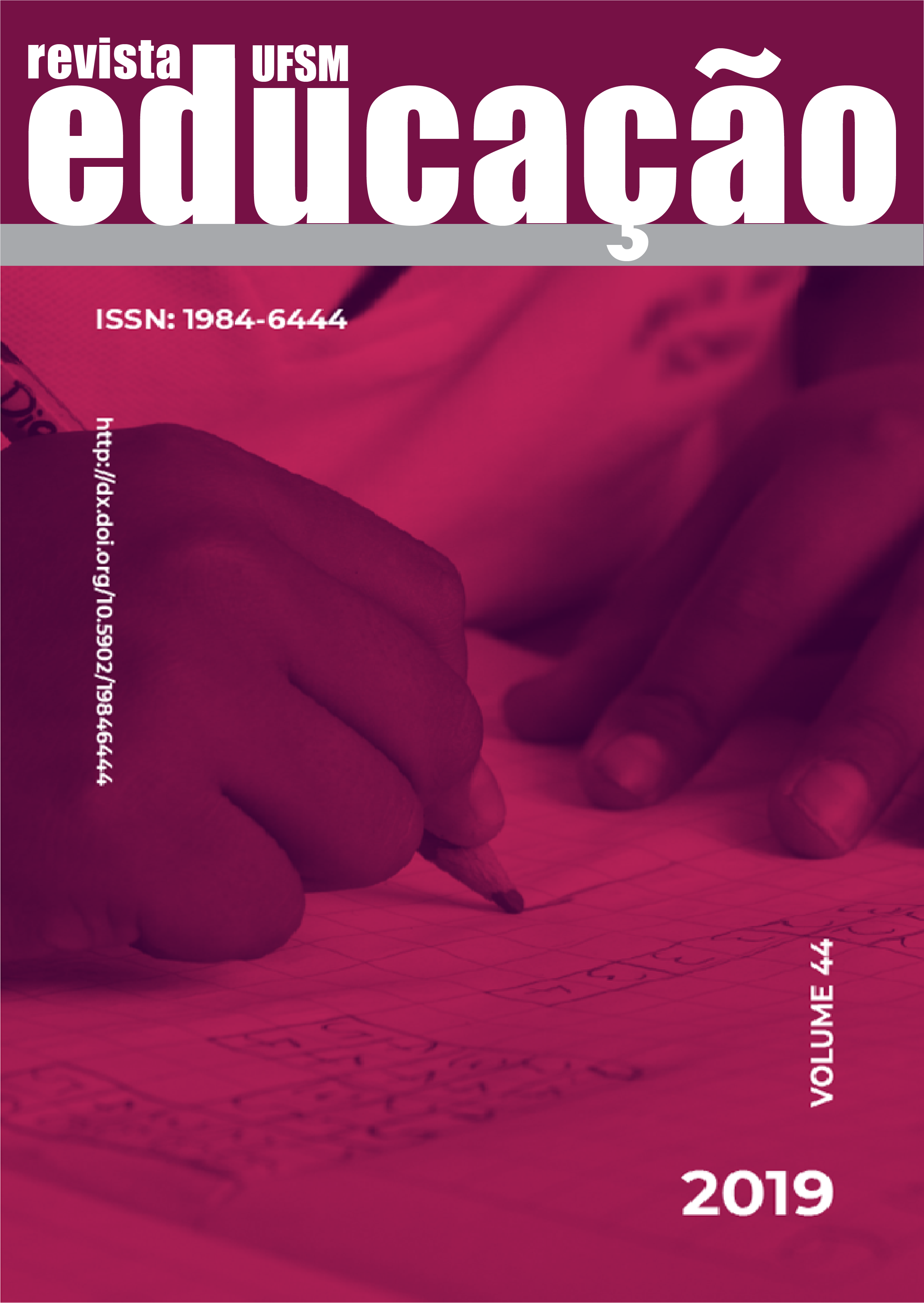Unpolitical Schools Movement and the ideas of Paulo Freire
DOI:
https://doi.org/10.5902/1984644432996Keywords:
Paulo Freire, Unpolitical Schools Movement, NeutralityAbstract
This paper aims at analyzing the foundations of the Unpolitical Schools Movement to criticize the thought of Paulo Freire, namely: the assumption of the neutrality of the educator. To do so, a qualitative bibliographical research will be carried out in which three interpretative axes will be used: (1) the conception of neutrality from the scientific paradigm and its consequences in education; (2) the relationship between education and politics; (3) Freire's conception of reading the world. It is intended, therefore, to confront some of the assumptions of this Movement, especially regarding the alleged neutrality of the educator with the Freirean conception of education. While Freire’s thought makes us strange to social practices, the Unpolitical Schools Movement seeks to naturalize the social world, which partly justifies its aversion to the thinking of Paulo Freire that is based on a plural world, in dispute for symbolic and material resources.
References
ARISTOTE. Politique. Trad. Jean Aubonnet. Paris: Les Belles Lettres, 1986.
BERTRAND, Yves; VALOIS, Paul. Paradigmas Educacionais: escola e sociedades. Lisboa: Instituto Piaget, 2001.
DINIZ FILHO, Luiz Lopes. Paulo Freire e a “educação bancária” ideologizada. In: Jornal Gazeta do Povo, 15/02/2013. Disponível em: http://www.escolasempartido.org/artigos-top/382-paulo-freire-e-a-educacao-bancaria-ideologizada. Acesso em: 25 out 2017.
FERNANDES, Maria Dilnéia Espíndola. O percurso político-legislativo do programa “Escola sem partido” em Campo Grande, MS. ETD – Educação Temática Digital, v.19, p.217-235, jan./mar., 2017. Disponível em: https://periodicos.sbu.unicamp.br/ojs/index.php/etd/article/view/8647432. Acesso em: 29 out. 2017.
FREIRE, Paulo. Alfabetização: leitura do mundo, leitura da palavra. Trad. Lólio Lourenço de Oliveira. São Paulo: Paz e Terra, 2011.
_____________. Política e educação. 8.ed. São Paulo: Villa das Letras, 2007.
_____________. Educação como Prática da Liberdade. 27.ed. Rio de Janeiro: Paz e Terra, 2003.
_____________. Pedagogia do Oprimido. São Paulo: Paz e Terra, 2001.
_____________. Pedagogia da Autonomia: saberes necessários à prática educativa. Rio de Janeiro: Paz e Terra, 2009.
_____________. A importância do ato de ler: em três artigos que se completam. 23ed. São Paulo: Cortez, 1989.
GOHN, Maria da Glória. Teorias dos movimentos sociais: paradigmas clássicos e contemporâneos. São Paulo: Loyola, 1997.
HUSSERL, Edmund. A crise das ciências europeias e a fenomenologia transcendental. Rio de Janeiro: Forense Universitária, 2012.
LACEY, Hugh. A imparcialidade da ciência e as responsabilidades dos cientistas. Scientiæ studia, São Paulo, v. 9, n. 3, p. 487-500, 2011.
____________. O lugar da ciência no mundo dos valores e da experiência humana. Scientiæ studia, São Paulo, v. 7, n. 4, p. 681-701, 2009.
NOVAIS, Carlos Eduardo. Supermercado: Catedral do Consumo. Disponível em http://vintagesc94.blogspot.com.br/2010/05/supermercados-as-catedrais-do-consumo.html. Acesso em: 29 out. 2017.
OLIVEIRA, Marcos Barbosa. Neutralidade da ciência, desencantamento do mundo e controle da natureza. Scientiæ studia, São Paulo, v. 6, n. 1, p. 97-116, 2008.
RESENDE, Leandro. 'Escola sem partido' quer fim da 'doutrinação de esquerda'. In: Jornal O Dia, 06/09/2015. Disponível em: http://odia.ig.com.br/noticia/brasil/2015-09-06/escola-sem-partido-quer-fim-da-doutrinacao-de-esquerda.html. Acesso em: 25 out. 2017.
RIBEIRO, Vera Masagão. Apresentação. In: AÇÃO EDUCATIVA (Org.). A ideologia do movimento Escola Sem Partido: 20 autores desmontam o discurso. São Paulo: Ação Educativa, 2016.
SILVA, Tomaz Tadeu. Identidades Terminais: as transformações na política da pedagogia e na pedagogia da política. Rio de Janeiro: Vozes, 1996.
SODRÉ, Muniz. Comunicação do Grotesco: um ensaio sobre a cultura de massa no Brasil. Rio de Janeiro: Vozes, 1986.
Downloads
Published
How to Cite
Issue
Section
License
Declaration of originality
We declare that all articles present in the journal Educação (UFSM) are originals and were not submitted for publishing on any other publication, as a whole or a fraction. We also declare that, after being published by Educação (UFSM), a paper will not be submitted to another journal within two years. After this time, our journal transfers the publishing rights to the authors, with a permit granted by the Editorial Council.
We also acknowledge that the originals’ submission to Educação (UFSM) implies on a transference of copyright for physical and digital publishing to the journal. In case of noncompliance, the violator will receive sanctions and penalties predicted by the Brazilian Copyright Protection Law (n. 9610, dated 19/02/98).
Attribution 4.0 International (CC BY 4.0)
This license lets others remix, transform, and build upon the material for any purpose, even commercially, and copy and redistribute the material in any medium or format.

This work is licensed under a Creative Commons Attribution 4.0 International (CC BY 4.0)






